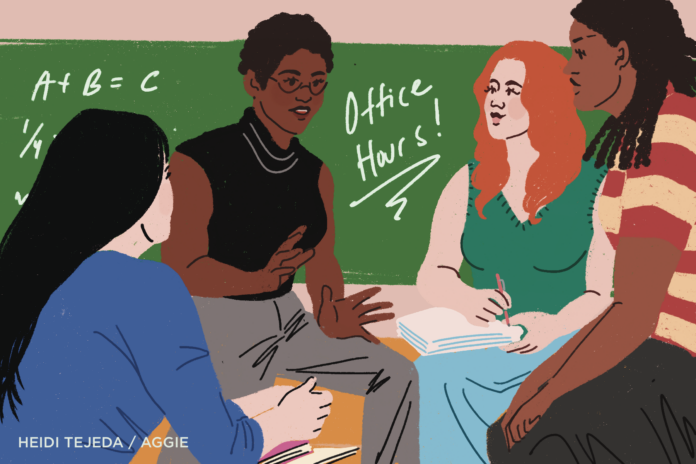Faculty and students dispel common myths about office hours and highlight their importance
By EMME DUNNING — features@theaggie.org
College can be challenging. Particularly at a competitive institution like UC Davis, it’s easy for students to become overwhelmed with mounting assignments and get lost in the shuffle of a large research institution. In these moments, many students don’t know where to turn for academic help.
Office hours can provide the solution. Nearly all teaching staff at the university offer office hours, providing students with the unique opportunity to learn from professors in a one-on-one setting, a method of teaching that is otherwise unfeasible at a large institution.
Despite the potential benefits, office hours are not a widely used resource. Meeting with a professor one-on-one can seem daunting, and there is a common misconception that they are solely for students struggling to grasp a specific concept or subject. This narrative deters students from utilizing this essential resource.
In reality, office hours should be seen not as scary or intimidating but instead as a low-stakes educational opportunity offered by teaching staff and available for all students. The benefits of office hours go far beyond answering clarifying questions and working through course material. Instead, office hours provide an opportunity to connect with teaching staff and build strong connections outside of the classroom.
Professor Eleftheria Arapoglou, a continuing lecturer in the American Studies department, has renamed her office hours to student hours in an effort to dispel the stigma surrounding the resource.
“I like calling them student hours,” Arapoglou said. “They are here for you.”
Arapoglou also asserted that there is no “right way” to approach these student hours.
“You don’t have to need advice to come [to office hours],” Arapaglou said. “Students can definitely ask clarifying questions and get hands-on advice on problem areas or muddy points, [but] another very important aspect is establishing connections with members of the campus community. When it comes to, for example, applying for graduate school or applying for a job, faculty members and people you work with can serve as references or even provide insights and tips as to how to go about applying for a position.”
Arapoglou also highlighted that she sees increased interest and growth from students who attend office hours in contrast to those who do not.
“The minute a student reaches out and establishes contact, most of the time what they get out of it is a positive experience. It reinforces their motivation, reinforces their determination. I typically see students doing much, much better both in their classes and also with respect to their life plans,” Arapoglou said.
Although certainly rooted in academic success, attending office hours also has social benefits. Kate Andrup Stephensen, current director of the University Honors Program, emphasized this social aspect.
“[Office hours] gives you the opportunity to get to know the person that’s teaching you, and that could lead to a whole slew of different things,” Stephenson said.
Beyond using office hours to excel in her coursework when she was in college, Stephenson also formed personal connections with instructors solely through attending office hours.
“I’m still close with a couple of faculty [members] that I took classes with and I really only got to know them because I took the time to go and chat with them in office hours,” Stephenson said. “I spent Thanksgiving with a faculty member once because I couldn’t go home for Thanksgiving. It’s that kind of benefit that you wouldn’t necessarily think of. It’s a much more human experience if you get to know the people that are teaching you.”
Stephensen is also aware that students can find the process of office hours extremely intimidating but hopes to dispel those stereotypes.
“We’re nervous to talk to you all too. We’re human. We’re curious. We’re excited. We want to talk to you all, that’s literally why we’re here,” Stephenson said. “If we didn’t want to engage with the younger generation or get to know students we wouldn’t be in this work.”
Kera Reinig, a third-year environmental science and management and economics double major, has seen the benefits of attending office hours firsthand during her time at UCD.
“I think [office hours] are very helpful,” Reinig said. “I think a lot of people just miss them or they think it’s not worth their time, but what I’ve found as the years go on is that they’re just as helpful as you think they might be. That’s why they’re set up for you.”
As students approach midterm season, it is more important than ever to utilize the resources available to us. By choosing to attend office hours, students can gain much more than a higher grade in their courses. Office hours provide students valuable opportunities to ask questions, gain career insights from faculty and form connections with other campus community members.
Written by: Emme Dunning — features@theaggie.org





